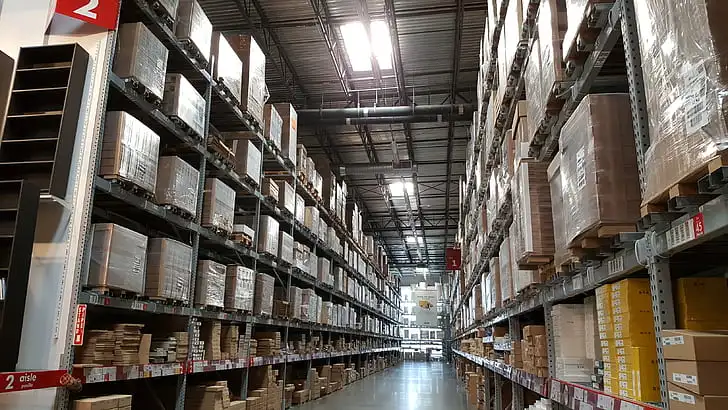Owning your stock requires a minimum of three things: a storage structure, physical space, and funding for the business. Outsourced storage is a possibility if you don’t have one of them. But is it feasible?
When hiring is properly organized and managed, the advantages materialize fast. These included lower labor and equipment expenditures in addition to improved item control and transportation.
It is crucial to keep in mind that these ideas become more effective when they are contextualized. Consequently, the market is more competitive.
It’s the kind of quality and agility that propels the business and, by extension, its management.
Learn about the idea of outsourced storage, how it operates, and its primary benefits in the upcoming topics. This could prove to be a very profitable tactical decision for your company!
Read also: How to Manage a Warehouse: The 10-Step Guide to Logistics Management
What is warehouse outsourcing?
Let’s review the different service types to understand what outsourced storage is. The names are suggestive, after all. Take a look at this quick overview of each.
Own storage: When the business is in charge of running the stock warehouse. The corporation owns the manufacturing locations and the warehouses that are used.
Contracted storage: In this scenario, the manufacturer merely leases the actual space needed to arrange the products. However, it keeps all of their logistical management and control.
Outsourced warehousing: Lastly, our content’s main focus is the option where an outsourced logistics company handles all of the product management and administration tasks.
We suggest giving it another read to fully comprehend all the information and the key distinctions between all the services.
What is an outsourced warehouse used for?
To put it briefly, management seeking to engage in outsourced storage looks for a physical location with sufficient organization and methods for assigning products.
The reasons can differ but the goal is nearly always the same: to improve logistical efficiency, both within and outside the company.
As a result, the steps are quite similar regardless of the technique selected or the business partner handling the process.
For this reason, a typical storage flowchart has seven steps. They are as follows:
- Receipt,
- Conference and inspection,
- Identification and addressing,
- Storage,
- Separation,
- Shipping and Delivery.
Interestingly, different kinds of storage can optimize each of these steps. As an example:
- The conference can be for larger amounts;
- Identification made by automatic software;
- The process of separation by areas, and so on.
Many managers are still unclear if outsourcing storage is the appropriate model for their organizations, even after learning what it is and how it operates.
The following topic is required to assess the advantages and, consequently, the cost-benefit of this type of strategy.
What are the advantages of warehouse outsourcing?
Outsourcing storage has advantages for businesses. You can increase the whole effectiveness of the company by making this decision, from improved personnel management to a clearer understanding of the logistics systems. We’ve divided out some of the advantages to be aware of.
1. Cost reduction
It’s one of the aspects of outsourcing storage as a business strategy that most managers find interesting. Reducing expenses is unquestionably necessary to turn logistics into a differentiator in the marketplace.
The list of expenses that are cut when a warehouse is outsourced includes those related to its continuity and operation. Such as electrical power, machinery and buildings, skilled labor, and so forth.
2. Tax cuts
Yes, taxes do play a role in a company’s expenses. However, we divided the subject because it calls for different explanations.
When the business is in the same state, the corporation may have its tax on operations related to the circulation of goods suspended. There might also be an exemption from tax on industrialized products at the federal level.
3. Best structures
Using the right storage structures is one factor that significantly affects how well businesses perform. And there are many reasons why you should give it some serious thought right now!
Incorrect structural choices lead to increased workplace mishaps and deterioration of stored goods. Stated differently, outsourcing logistics becomes intriguing when partners possess dependable frameworks.
4. Less bureaucracy
One of the most crucial areas for businesses is logistics since its performance can be a sign of profit. However, the contrary is also true: losses are a sign of failure. The bureaucracy surrounding the things that are stored is also one of the most important factors.
The manager can choose strategic partners who can even handle this kind of challenge by depending on outsourced storage. Consequently, there is reduced deterioration of paperwork, governing bodies, and other bureaucracies.
5. People management
Certain industries demand extra caution when it comes to product storage. This is the situation with the healthcare and food sectors. Moreover, stocking products is a job that requires knowledge and education and should not be performed by just any professional.
Although there is a price for this, the efforts are split throughout departments, such as production and sales. As a result, you gain from management that is more concerned with finding solutions for customers and making investments in innovation when you outsource the service.
6. Best location
The location is an additional advantage. Businesses might outsource inventories to more strategically located sites by considering the optimal logistics and the mode of transportation. As a result, there is increased delivery agility and decreased route expenses.
It’s also important to keep in mind that the distance to the factory or input suppliers may be taken into account while making this choice. Every decision needs to be carefully considered, and location is just one more tactical element that can make your company more competitive.
7. More technology
To keep the company that outsourced the storage updated on developments, specialized technology is required. He can digitally track orders, for instance.
One way that supply chain monitoring helps managers in the industry is by enabling them to make more forceful judgments. Additionally, receiving updates regarding orders and shipments increases the satisfaction of customers. The technology works better for logistics.
Learn all there is to know about storage automation
Process View
As a result of everything, managers can assess the situation holistically and have a far wider perspective of the procedures in this industry. Additionally, this kind of viewpoint facilitates more aggressive, prompt, and smart decision-making.
And all while keeping the client at the forefront. After all, it is easier to identify malfunctions when all of the logistics equipment is visible and operational. Along with creating decisive steps to enhance services and provide customers with outcomes.
Is it worth investing in an outsourced warehouse?
After all of this reading, the ultimate query about the substance is the same as the title. To determine whether outsourced storage is worthwhile or the right model for your firm, examine your present requirements and design.
This kind of storage solution has shown to be an excellent option for companies that have a long-term perspective. Among all the benefits, it offers long-term gains at every phase of the logistics process, from lower expenses to improved client satisfaction.
If you enjoyed this article, please keep up with our blog posts and contact us for any business-related queries.




